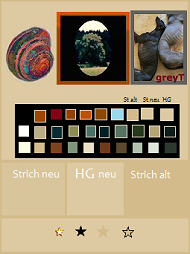 ooooooooo
ooooooooo 2. MENSCH
2. MENSCH 2.1. Infostand
2.1. Infostand 2.2. Links
2.2. Links 2.3. Teestube / Cafe
2.3. Teestube / Cafe 2.3.1. Schwarzes Brett
2.3.1. Schwarzes Brett 2.3.2. Computer & Netz
2.3.2. Computer & Netz 2.3.3 Séparée
2.3.3 Séparée 2.4. Bilder, Videos & Pic's
2.4. Bilder, Videos & Pic's 2.5. Bibliothek
2.5. Bibliothek 2.5.1. Medien - deutsch
2.5.1. Medien - deutsch 2.5.2. Medien - englisch
2.5.2. Medien - englisch 2.6. Greytalk
2.6. Greytalk 2.7. Veranstaltungen
2.7. Veranstaltungen 2.7.1. zu spät..
2.7.1. zu spät.. 2.8. Reise&bestimmungen
2.8. Reise&bestimmungen 2.9. Urlaubsbetreuung
2.9. Urlaubsbetreuung  2.10. Nähen & Basteln
2.10. Nähen & Basteln 2.11. Herrgottswinkerl
2.11. Herrgottswinkerl 3. HUND
3. HUND 3.1. Der Renngrey
3.1. Der Renngrey 3.2. Zucht
3.2. Zucht 3.3. Aufzucht
3.3. Aufzucht 3.4. Ernährung
3.4. Ernährung 3.5. Haltung & Pflege
3.5. Haltung & Pflege 3.6. Erziehung*Verhalten
3.6. Erziehung*Verhalten  3.7. Training
3.7. Training 3.8. Gesundheit
3.8. Gesundheit 3.8.1. Impfung
3.8.1. Impfung  3.8.2. Greyhoundsperre
3.8.2. Greyhoundsperre 3.8.3 Verletzungen
3.8.3 Verletzungen 3.8.4 Krankheiten
3.8.4 Krankheiten 3.8.4.1. Erbkrankheiten
3.8.4.1. Erbkrankheiten 3.8.5. Parasiten
3.8.5. Parasiten 3.8.6. Geschwüre - Krebs
3.8.6. Geschwüre - Krebs 3.8.7. Schulmedizin
3.8.7. Schulmedizin  3.8.8. Alternativmedizin
3.8.8. Alternativmedizin 3.8.9. Chiro & Massage
3.8.9. Chiro & Massage 3.8.10. Hexenküche
3.8.10. Hexenküche 3.9. Doping
3.9. Doping 4. LEISTUNG & PROFIT
4. LEISTUNG & PROFIT 4.1. Coursing & Jagd
4.1. Coursing & Jagd 4.2. Bahnrennen
4.2. Bahnrennen 4.3. Rennthemen D-A-CH
4.3. Rennthemen D-A-CH  4.4. Rennen kommerziell
4.4. Rennen kommerziell 4.4.1. Renngeschehen Irl
4.4.1. Renngeschehen Irl 4.4.2. Renngeschehen UK
4.4.2. Renngeschehen UK 4.4.3. Rennthemen USA
4.4.3. Rennthemen USA 4.4.4. Rennthemen Aus
4.4.4. Rennthemen Aus 4.4.5. Wettgeschehen
4.4.5. Wettgeschehen 4.5. Was sonst noch geht
4.5. Was sonst noch geht 5. TIERHEIM
5. TIERHEIM ** 5.1. Entlaufen **
** 5.1. Entlaufen ** 5.1.1. Streuner zurück
5.1.1. Streuner zurück 5.2. Greys in D,A,Ch
5.2. Greys in D,A,Ch 5.3. Greys in Europa
5.3. Greys in Europa 5.4. Rehomed
5.4. Rehomed 5.5. Orgas/Vereine/Inis
5.5. Orgas/Vereine/Inis 5.6. Mfg. für Hunde
5.6. Mfg. für Hunde 5.7. Was bisher geschah
5.7. Was bisher geschah 6. TIER- & ARTENSCHUTZ
6. TIER- & ARTENSCHUTZ 6.1. Greyhounds
6.1. Greyhounds 6.2. Haustiere allgemein
6.2. Haustiere allgemein 6.3. Natur- & Artenschutz
6.3. Natur- & Artenschutz 6.4. Horrorecke
6.4. Horrorecke
5.9.19 - ACHTUNG - Reisewarnung Norwegen für Hundebesitzer
Begonnen von Oval 5, 05.09.2019, 21h54
vorheriges - nächstes
Benutzer-Aktionen





